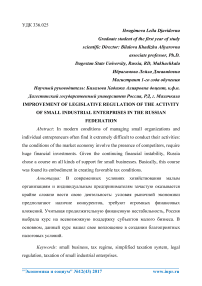Совершенствование законодательного регулирования деятельности малых промышленных предприятий в Российской Федерации
Автор: Ибрагимова Л.Д.
Журнал: Экономика и социум @ekonomika-socium
Статья в выпуске: 12 (43), 2017 года.
Бесплатный доступ
В современных условиях хозяйствования малым организациям и индивидуальным предпринимателям зачастую оказывается крайне сложно вести свою деятельность: условия рыночной экономики предполагают наличие конкурентов, требуют огромных финансовых вложений. Учитывая продолжительную финансовую нестабильность, Россия выбрала курс на всевозможную поддержку субъектов малого бизнеса. В основном, данный курс нашел свое воплощение в создании благоприятных налоговых условий.
Малое предпринимательство, правовое регулирование, налогообложение малых промышленных предприятий
Короткий адрес: https://sciup.org/140236661
IDR: 140236661
Текст научной статьи Совершенствование законодательного регулирования деятельности малых промышленных предприятий в Российской Федерации
Ключевые
слова:
малое предпринимательство, правовое
регулирование, налогообложение малых промышленных предприятий.
The governments of most developed countries define small business as a special subject of state regulation. The peculiarity of small business has shaped the peculiarities of its taxation, which is oriented to long-term development and is tied to the really developing economic proportions within this sector. The problem of small and medium-sized businesses is already laid down in the definition of entrepreneurship. Entrepreneurship always involves a risk that can’t always be foreseen. Because of the risk, businesses can’t stand in the market, and many of them cease to exist. But the more the initial capital is invested in an enterprise, the higher its chances of survival in a competitive struggle. The next big problem arises: lack of investment resources, inaccessibility of loans. Banks in the issuance of loans should be confident that the enterprise will be solvent, they need a thoughtful business plan, which in many respects will depend on what knowledge the future entrepreneur has, how realistic he assesses his capabilities, etc. An entrepreneur must have good credit history, "quality" pledge. [1]
The smallest and medium-sized enterprises are enterprises engaged in commercial activities and public catering. It is necessary to increase the share of enterprises serving science, dealing with science. They can bring a large amount of investment in the budget, and this is the most promising area of entrepreneurial activity in the era of information computer technology and scientific and technological progress.
The next small business problem: high taxes and fees. Depending on the type of taxation: a traditional taxation system or a simplified system, an entrepreneur pays various interest rates. But there are also compulsory payments to various funds, for example, insurance premiums and business expenses. Therefore, entrepreneurs incur large monetary losses, and it becomes unprofitable for them to conduct business.
The federal law "On the development of small and medium-sized businesses in the Russian Federation" in order to implement the state policy in the development of small and medium-sized business in the Russian Federation provides for the following measures:
-
1) special tax regimes, simplified rules for maintaining tax accounting, simplified forms of tax returns for individual taxes and fees for small businesses;
-
2) simplified methods of accounting, including simplified accounting (financial) reporting, and a simplified procedure for conducting cash transactions for small businesses;
-
3) simplified procedure for compiling statistical reports by small and medium-sized businesses;
-
4) preferential procedure for settlements for state and municipal property privatized by small and medium-sized business entities;
-
5) measures to ensure the rights and legitimate interests of small and medium-sized businesses in the implementation of state control;
-
6) measures to ensure financial support for small and medium-sized businesses, organizations that form the infrastructure for supporting small and medium-sized businesses;
-
7) measures to develop the infrastructure for supporting small and medium-sized businesses;
-
8) other measures aimed at ensuring the implementation of the goals and principles of this Federal Law. [2]
In order to support small businesses, the Tax Code of the Russian Federation since 2015 includes provisions on the so-called tax holidays. Their essence is that within a certain period of time taxation will be carried out at a rate of 0%. However, this privilege did not apply to all entrepreneurs and did not affect all taxes.
The right to zero-rate taxation will be available to individuals who:
-
• first registered as IP since 2015;
-
• are in the USN or patent system for paying taxes;
-
• conduct business in social, scientific or industrial spheres (specific types of activity falling under preferential treatment are determined by regional legislation).
Forced business entrepreneurs could only when calculating tax on a simplified taxation system. Administrative barriers and corruption – one of the biggest problems holding back the development of small businesses. With administrative barriers, one should understand the existence of numerous by-laws, contradictions between different levels of legislation (federal and regional), a large amount of reporting, a large number of supervisory bodies, etc. We believe that it is necessary to eliminate contradictions between the federal and regional levels of legislation; checks carried out by various bodies should be reduced, which makes them more coherent; It is also necessary to provide entrepreneurs with all the necessary information on requirements of regulatory bodies. Thus, we can distinguish the following problems, which are currently in small and medium business:
-
• a small percentage of enterprises engaged in science or serving science;
-
• difficulties in obtaining loans from credit institutions;
-
• high taxes;
-
• administrative barriers and corruption;
-
• lack of competent staff.
Thus, the solution of these problems will help small businesses develop more, this means that new goods (works, services) will be created, new jobs will be created, the country's economy will develop.
Список литературы Совершенствование законодательного регулирования деятельности малых промышленных предприятий в Российской Федерации
- Khayrullina DR Increase of efficiency of management by development of small enterprises of sphere of services: the dis. Cand. econ. Sciences/Khairullina DR; Nizhny Novgorod. state. engineer-econ. in-t. -Knyaginino, 2015. -230 p.
- Federal Law No. 209-FZ of July 24, 2007 (as amended on July 26, 2012) "On the development of small and medium-sized business in the Russian Federation".


